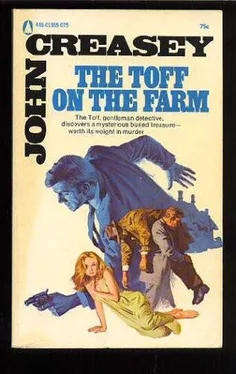John Creasey - The Toff on The Farm
Здесь есть возможность читать онлайн «John Creasey - The Toff on The Farm» весь текст электронной книги совершенно бесплатно (целиком полную версию без сокращений). В некоторых случаях можно слушать аудио, скачать через торрент в формате fb2 и присутствует краткое содержание. Жанр: Старинная литература, на русском языке. Описание произведения, (предисловие) а так же отзывы посетителей доступны на портале библиотеки ЛибКат.
- Название:The Toff on The Farm
- Автор:
- Жанр:
- Год:неизвестен
- ISBN:нет данных
- Рейтинг книги:5 / 5. Голосов: 1
-
Избранное:Добавить в избранное
- Отзывы:
-
Ваша оценка:
- 100
- 1
- 2
- 3
- 4
- 5
The Toff on The Farm: краткое содержание, описание и аннотация
Предлагаем к чтению аннотацию, описание, краткое содержание или предисловие (зависит от того, что написал сам автор книги «The Toff on The Farm»). Если вы не нашли необходимую информацию о книге — напишите в комментариях, мы постараемся отыскать её.
The Toff on The Farm — читать онлайн бесплатно полную книгу (весь текст) целиком
Ниже представлен текст книги, разбитый по страницам. Система сохранения места последней прочитанной страницы, позволяет с удобством читать онлайн бесплатно книгу «The Toff on The Farm», без необходимости каждый раз заново искать на чём Вы остановились. Поставьте закладку, и сможете в любой момент перейти на страницу, на которой закончили чтение.
Интервал:
Закладка:
She said: “Yes, goodbye.”
Keen was sweeping across towards her, hand outstretched as if he would like to take the receiver before she replaced it; but he hadn’t a chance. It seemed to Rollison that Gillian made sure of that, and then stood almost defensively in front of the telephone.
“Who was that?” demanded Keen, roughly.
“A friend of mine.”
“What friend?”
“Just a friend,” said Gillian, and turned away. Keen stood in his new-found arrogance, but he could not find the right thing to say. Rollison moved past him towards the girl, and before Keen spoke, he said :
“Have you any close friends near here, Gillian?”
“No,” answered Gillian, drably.
“No one who could come and stay with you for a bit, or with whom you could stay?”
“No.”
“Where have you some friends?”
“Only in London.”
“Who would come and stay with you?”
She said as if with an effort: “Monty’s sister might. I don’t know. Who would want to, after this?” She looked drearily out of the window, and all the life had been drained out of her, partly by the succession of shocks—and partly by what had been said on the telephone, Rollison imagined. “I don’t even know if I can stay here.” She began to shiver, and that didn’t surprise Rollison. “Why don’t you find Alan? Everything will be all right if you’d only find Alan.”
“We’re doing everything we can,” Rollison said, and was all too aware of the futility of the words.
“Well,” Gillian retorted, “it isn’t much.”
Keen came across, took up the telephone, and called his headquarters; once routine was needed, he was a man again. He was never likely to be good enough to take responsibility, Rollison thought. Keen didn’t greatly matter, except that he would probably be fairly easy to handle.
He put the receiver down.
“They’ll be out within forty minutes,” he said, “and a patrol car will be here before then. You’re asked to stay here, Mr. Rollison. And you. Miss.” He looked dubiously at Gillian.
“Where else would I go?” asked Gillian, in that new, helpless way.
“We’ll stay close by,” promised Rollison. “Miss Selby ought to get some air, sergeant. We’ll stroll across to the farm, if that’s all right with you.”
Keen obviously wished they wouldn’t, but decided not to stop them. Perhaps he thought it better to let them go, and have them followed. Gillian was prepared to do whatever Rollison wanted. They went out the back way. It was beautiful in the garden, with the meadows and the woods beyond, and much warmer than it had been during the morning. The sky was clear, and the birds were busy and noisy, and insects were humming and hovering. Half way down the garden was a fork, dug into the freshly turned earth. Rollison saw Gillian’s eyes flood with tears.
“Alan’s?” he asked.
“Yes.”
“Did he often leave a fork in the ground overnight?”
“Yes, I was always telling him about it.”
“Very fond of him, Gillian ?”
“He’s been mother and father and brother to me,” she said, heavily. “He’s fifteen years older than I am, you see. Oh, God, I can’t stand it if anything happens to him !”
It was useless to say: “It won’t,” for more empty comfort now would make real comfort impossible later; and it might be desperately needed.
They went towards the end of the garden and to a small gate which opened onto a field; beyond was the farm itself. It looked as if it had been standing there for four hundred years, and would stay for another four hundred. It was low and snug and picturesque, with its mullioned windows, its gables, its lichen-covered tiles and its red brick with the great oak beams in it. Here was a little of England’s past, with the smoke of the present curling lazily out of a squat round chimney.
“Gillian,” Rollison asked, “who was on the telephone?”
“A friend.”
“You needn’t lie to me.” She didn’t look at him. “I’m not lying to you.”
“It wasn’t a friend. It was another threat to Alan, wasn’t it?”
“It was a friend.”
“If you don’t tell me everything, how can I help?”
“How can you help?” she echoed, and turned to glare at him, her eyes flashing, colour storming back in her cheeks, as if anger was the stimulant that she needed. “You’ve let two men be murdered, you haven’t done a thing to find Alan, you haven’t done anything at all. Why, Tex Brandt did twice as much as you in half the time !”
“Did he telephone?”
“No!”
“Who was it, Gillian?”
“It was a friend from the village, she wanted me to go and sit in for her tonight, I told her I couldn’t.” The he, if it was a he, came out very pat: but Rollison felt sure that it was untrue. “Now don’t keep pestering me, you might just as well go home.”
“Soon,” he said. “I want to see Tex, too. Who telephoned you, and what did he say?”
“I’ve told you, it’s no use pestering me,” Gillian cried. “I’m not going to tell you another thing !”
She turned and half ran back to the house. Detective Sergeant Keen stood by the window, giving Rollison the impression that he was glad she was on the way back, and probably maliciously pleased that Rollison had obviously not got far with the girl. Rollison watched her disappear into the kitchen, and then he walked on, briskly. The girl was worked up to the highest possible pitch of tension and hardly responsible for what she said; but he wasn’t any more pleased with himself than she was. It was not that he had done so little, for he had not been here more than three and a half hours; it was because he could not be sure that he had done any of the right things. He had allowed Charlie to stay here unguarded, and so was indirectly responsible for the man’s death; that was the most unpleasant thought. True, Charlie hadn’t been one of the most lovable of men, but he did not necessarily deserve to die.
He might have been very informative, too.
And Rollison was not sure that he had been right to allow the Texan to leave. Brandt might go to the Mayfair flat, but he could be roaming around. He might even be near here. He could have killed Charlie, and if it came to that, he could have killed Lodwin, for he had been upstairs in the Brighton house first, and Lodwin certainly hadn’t been dead very long.
Rollison reached some wooden outhouses.
Here was the smell of the farmyard, rich, ripe and earthy. Here was a muddled, unkempt farm, with a dirty yard, a few dry-looking heaps of manure, only one of them steaming slightly, a dozen fowls, pecking and scratching, a pig roaming. The walls of the barn and other outbuildings wanted renewing, repairing wouldn’t do much good; and the whole place had an appearance of decay. Even the farmhouse itself lost much of its picturesqueness because he was too close; the walls wanted painting, the oak beams looked as if they were rotting, too many of the little leaded panes of glass were cracked, too many tiles were broken. Hens clucked, flies were already swarming. In a nearby field a heifer plodded past.
Then Rollison stood to one side and peered through a window into a low-ceilinged room. He saw several wrapped hams hanging from rafters, and the bright fire in the huge fireplace. But for that brightness the room looked dark and dingy, but it was not the appearance of the room which caught and held Rollison’s interest.
A man who looked very old indeed was standing by the fireplace, fingers clasped round a poker much as Gillian’s had been, and shaking the poker in a kind of threat at a man whom Rollison could not see.
Rollison moved his position, to see better.
It was Montagu Montmorency Morne.
10
Читать дальшеИнтервал:
Закладка:
Похожие книги на «The Toff on The Farm»
Представляем Вашему вниманию похожие книги на «The Toff on The Farm» списком для выбора. Мы отобрали схожую по названию и смыслу литературу в надежде предоставить читателям больше вариантов отыскать новые, интересные, ещё непрочитанные произведения.
Обсуждение, отзывы о книге «The Toff on The Farm» и просто собственные мнения читателей. Оставьте ваши комментарии, напишите, что Вы думаете о произведении, его смысле или главных героях. Укажите что конкретно понравилось, а что нет, и почему Вы так считаете.












